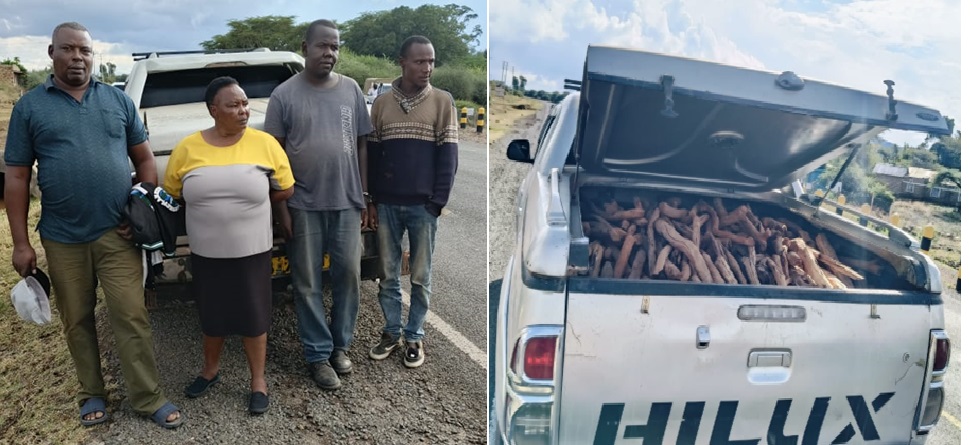A multi-agency security team has successfully dismantled a sandalwood smuggling syndicate and arrested a key suspect, Margaret Wambui Wambugu, also known as Maggy, who is believed to be orchestrating the illicit trade with the help of rogue security officers.
Maggy, along with three other suspects, is currently in police custody.
Investigations reveal that Maggy has been trafficking endangered sandalwood, harvested from the forests of Samburu, to Uganda via the porous Busia border.
“Maggy, as she is commonly known, hails from Molo and runs an elaborate syndicate with members who assist her in the trade. She collaborates with security officers from the Kenya Forest Service, Kenya Wildlife Service, and the National Police Service, paying between Ksh 300,000 to Ksh 500,000 for their assistance in moving the contraband,” the report details.
Together with her son, Clinton Wambugu, Maggy reportedly camps in Wamba, Samburu County, every fortnight to oversee the extraction of sandalwood from the forests.
The investigation also found that she uses locals from the community to harvest the precious wood.
Further she organizes the workers through community leaders, such as chairpersons and chiefs, offering facilitation fees ranging from Ksh 3,000 to Ksh 5,000.
“The areas where the sandalwood is harvested are remote and difficult to access,” the report adds.
“Security officers, using government vehicles, particularly Land Cruisers, assist in transporting the consignment to more accessible locations, where they are loaded and moved to Uganda”, it adds.
The suspect is said to enjoy the protection of government officers, who ensure the smuggled sandalwood is transported to Tororo in Uganda without being intercepted at roadblocks.
The arrest sends a strong message to officers involved in facilitating and aiding the illegal harvesting and smuggling of sandalwood.
In the wake of the successful sting operation, authorities are calling for increased efforts to combat the illegal trade, including enhanced monitoring systems and more frequent patrols in sandalwood-rich areas.
They also emphasize the need for strict penalties for illegal harvesting.
Authorities are also stressing the importance of community engagement and sensitization to protect the trees.
“Engaging local communities in sustainable harvesting and replanting initiatives, allowing them to benefit from the conservation efforts we can ensure they benefit from the ecological value of the trees and reduce the incentive for illegal logging,” they advise.
EXPLAINER
In 2018, the East African sandalwood tree was listed as an endangered species on the Convention on International Trade in Endangered Species (CITES) of Wild Fauna and Flora.
However, Sandalwood trafficking has continued in the region due to the high demand from Asia for its oil. In the international market, one litre of sandalwood oil sells for as much as US$3,000.
In Kenya, sandalwood grows naturally in drylands of Baringo, Samburu, Isiolo, Makueni, Kitui, Machakos and Kajiado Counties.





